NRSG 355: Nursing Assignment: Prioritization, Collaboration, & Care
VerifiedAdded on 2022/10/03
|11
|3093
|167
Report
AI Summary
This nursing assignment report, prepared for NRSG 355, meticulously addresses key aspects of clinical practice, including prioritization and delegation in emergency situations, collaborative and therapeutic practices within multidisciplinary teams, provision and coordination of care using the ISBAR format and assessment protocols, and time management strategies within a team nursing model. The report analyzes a scenario involving multiple patient needs, from an unconscious post-operative patient to staff shortages, and offers reasoned decisions based on nursing principles and best practices, supported by relevant literature and references. The assessment explores the application of different nursing models, such as team nursing, to improve patient outcomes and ensure efficient workflow. The report also addresses issues of communication, role disputes, and professional commitment within a healthcare setting, proposing strategies such as collaboration and accommodation to resolve conflicts and enhance teamwork. The assignment underscores the importance of clinical decision-making, assessment, and effective communication in providing optimal patient care.
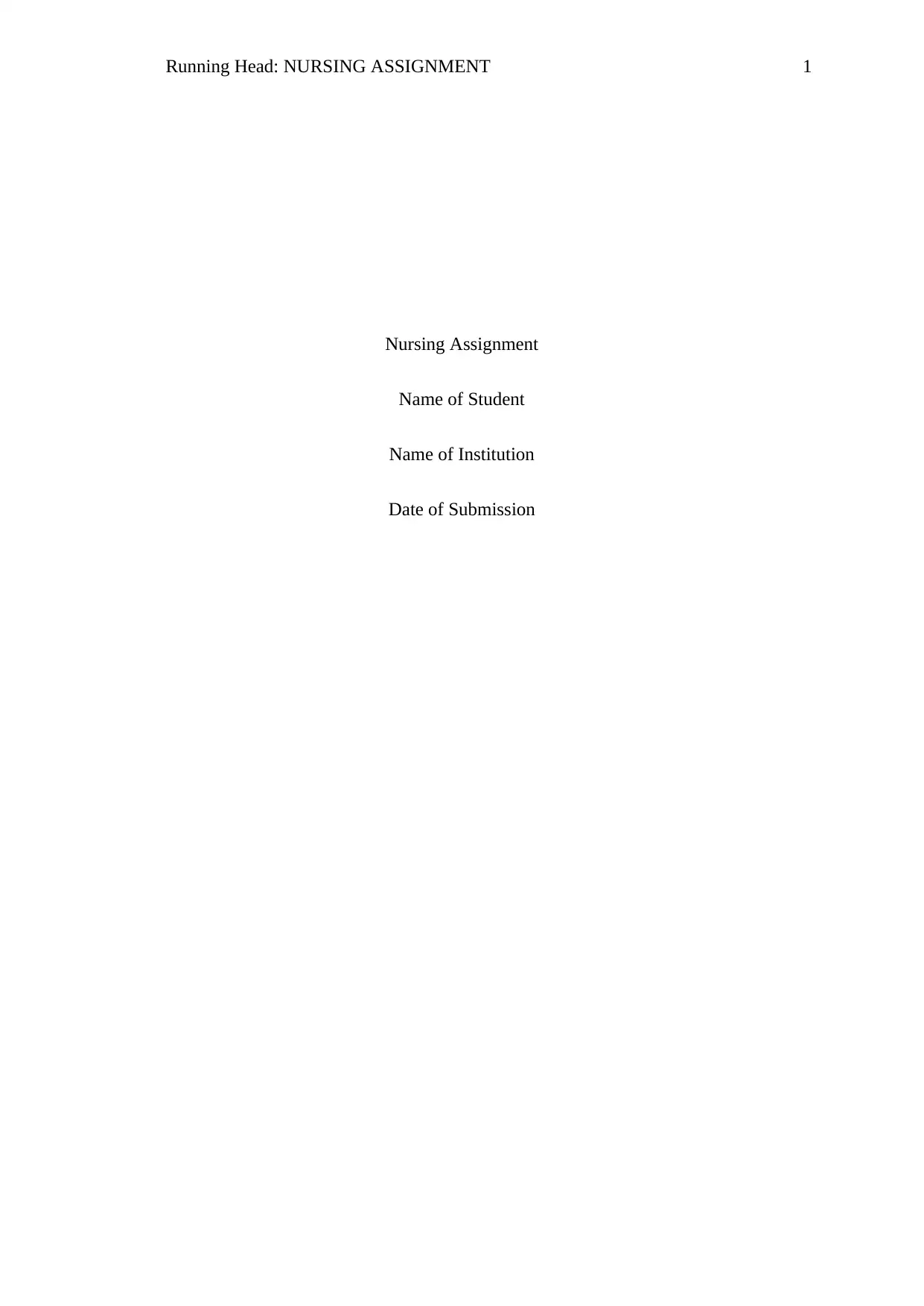
Running Head: NURSING ASSIGNMENT 1
Nursing Assignment
Name of Student
Name of Institution
Date of Submission
Nursing Assignment
Name of Student
Name of Institution
Date of Submission
Paraphrase This Document
Need a fresh take? Get an instant paraphrase of this document with our AI Paraphraser
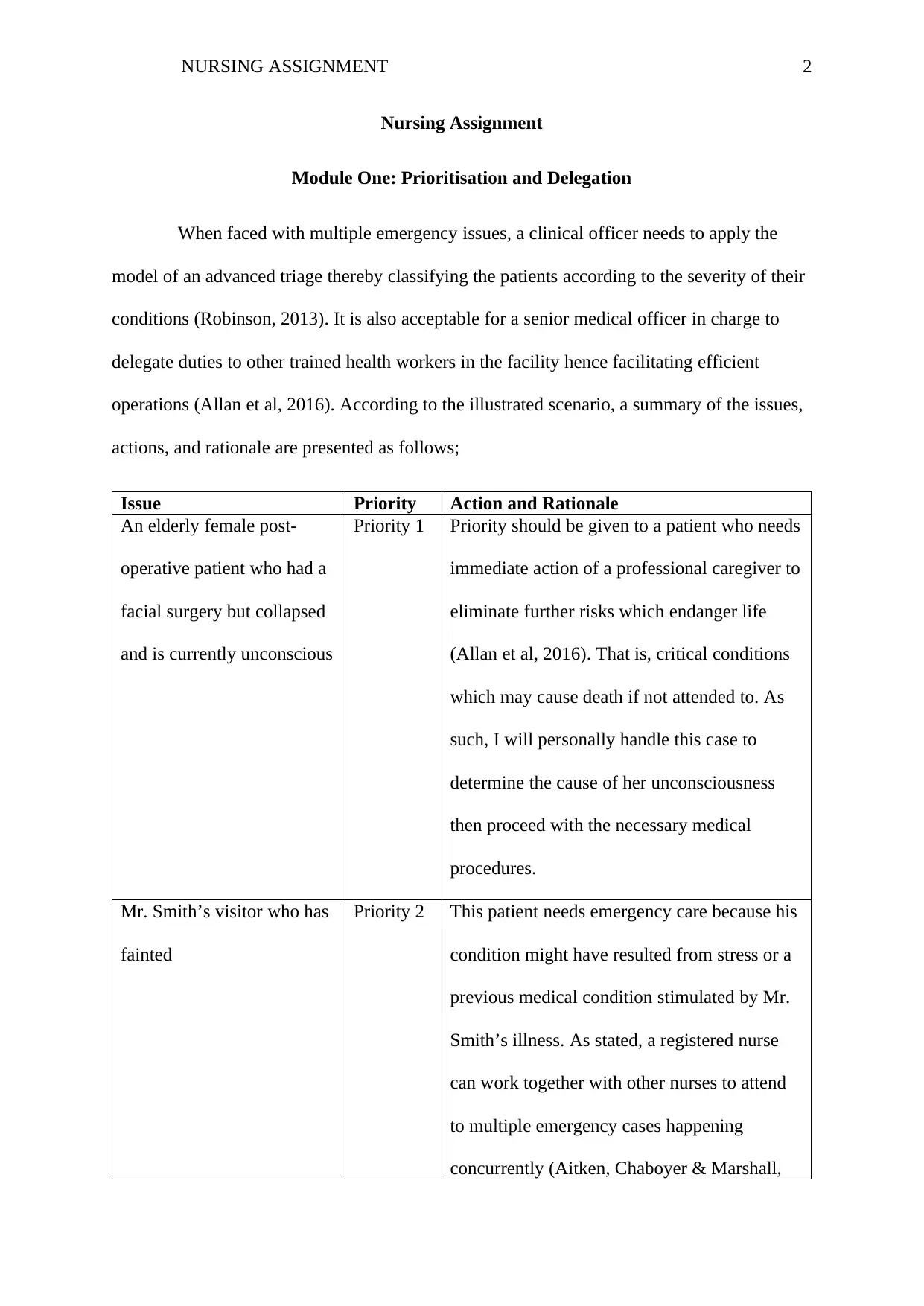
NURSING ASSIGNMENT 2
Nursing Assignment
Module One: Prioritisation and Delegation
When faced with multiple emergency issues, a clinical officer needs to apply the
model of an advanced triage thereby classifying the patients according to the severity of their
conditions (Robinson, 2013). It is also acceptable for a senior medical officer in charge to
delegate duties to other trained health workers in the facility hence facilitating efficient
operations (Allan et al, 2016). According to the illustrated scenario, a summary of the issues,
actions, and rationale are presented as follows;
Issue Priority Action and Rationale
An elderly female post-
operative patient who had a
facial surgery but collapsed
and is currently unconscious
Priority 1 Priority should be given to a patient who needs
immediate action of a professional caregiver to
eliminate further risks which endanger life
(Allan et al, 2016). That is, critical conditions
which may cause death if not attended to. As
such, I will personally handle this case to
determine the cause of her unconsciousness
then proceed with the necessary medical
procedures.
Mr. Smith’s visitor who has
fainted
Priority 2 This patient needs emergency care because his
condition might have resulted from stress or a
previous medical condition stimulated by Mr.
Smith’s illness. As stated, a registered nurse
can work together with other nurses to attend
to multiple emergency cases happening
concurrently (Aitken, Chaboyer & Marshall,
Nursing Assignment
Module One: Prioritisation and Delegation
When faced with multiple emergency issues, a clinical officer needs to apply the
model of an advanced triage thereby classifying the patients according to the severity of their
conditions (Robinson, 2013). It is also acceptable for a senior medical officer in charge to
delegate duties to other trained health workers in the facility hence facilitating efficient
operations (Allan et al, 2016). According to the illustrated scenario, a summary of the issues,
actions, and rationale are presented as follows;
Issue Priority Action and Rationale
An elderly female post-
operative patient who had a
facial surgery but collapsed
and is currently unconscious
Priority 1 Priority should be given to a patient who needs
immediate action of a professional caregiver to
eliminate further risks which endanger life
(Allan et al, 2016). That is, critical conditions
which may cause death if not attended to. As
such, I will personally handle this case to
determine the cause of her unconsciousness
then proceed with the necessary medical
procedures.
Mr. Smith’s visitor who has
fainted
Priority 2 This patient needs emergency care because his
condition might have resulted from stress or a
previous medical condition stimulated by Mr.
Smith’s illness. As stated, a registered nurse
can work together with other nurses to attend
to multiple emergency cases happening
concurrently (Aitken, Chaboyer & Marshall,
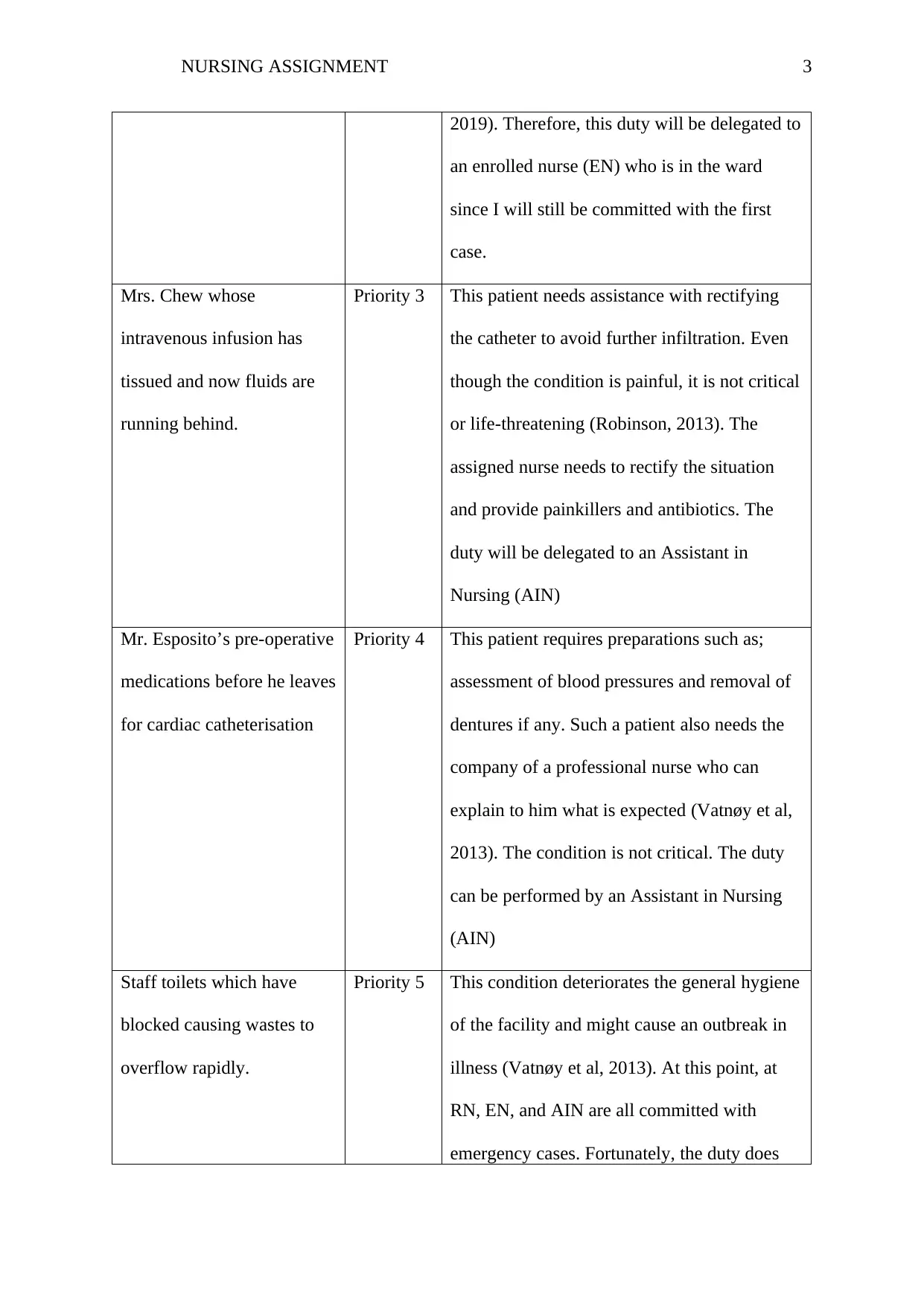
NURSING ASSIGNMENT 3
2019). Therefore, this duty will be delegated to
an enrolled nurse (EN) who is in the ward
since I will still be committed with the first
case.
Mrs. Chew whose
intravenous infusion has
tissued and now fluids are
running behind.
Priority 3 This patient needs assistance with rectifying
the catheter to avoid further infiltration. Even
though the condition is painful, it is not critical
or life-threatening (Robinson, 2013). The
assigned nurse needs to rectify the situation
and provide painkillers and antibiotics. The
duty will be delegated to an Assistant in
Nursing (AIN)
Mr. Esposito’s pre-operative
medications before he leaves
for cardiac catheterisation
Priority 4 This patient requires preparations such as;
assessment of blood pressures and removal of
dentures if any. Such a patient also needs the
company of a professional nurse who can
explain to him what is expected (Vatnøy et al,
2013). The condition is not critical. The duty
can be performed by an Assistant in Nursing
(AIN)
Staff toilets which have
blocked causing wastes to
overflow rapidly.
Priority 5 This condition deteriorates the general hygiene
of the facility and might cause an outbreak in
illness (Vatnøy et al, 2013). At this point, at
RN, EN, and AIN are all committed with
emergency cases. Fortunately, the duty does
2019). Therefore, this duty will be delegated to
an enrolled nurse (EN) who is in the ward
since I will still be committed with the first
case.
Mrs. Chew whose
intravenous infusion has
tissued and now fluids are
running behind.
Priority 3 This patient needs assistance with rectifying
the catheter to avoid further infiltration. Even
though the condition is painful, it is not critical
or life-threatening (Robinson, 2013). The
assigned nurse needs to rectify the situation
and provide painkillers and antibiotics. The
duty will be delegated to an Assistant in
Nursing (AIN)
Mr. Esposito’s pre-operative
medications before he leaves
for cardiac catheterisation
Priority 4 This patient requires preparations such as;
assessment of blood pressures and removal of
dentures if any. Such a patient also needs the
company of a professional nurse who can
explain to him what is expected (Vatnøy et al,
2013). The condition is not critical. The duty
can be performed by an Assistant in Nursing
(AIN)
Staff toilets which have
blocked causing wastes to
overflow rapidly.
Priority 5 This condition deteriorates the general hygiene
of the facility and might cause an outbreak in
illness (Vatnøy et al, 2013). At this point, at
RN, EN, and AIN are all committed with
emergency cases. Fortunately, the duty does
⊘ This is a preview!⊘
Do you want full access?
Subscribe today to unlock all pages.

Trusted by 1+ million students worldwide
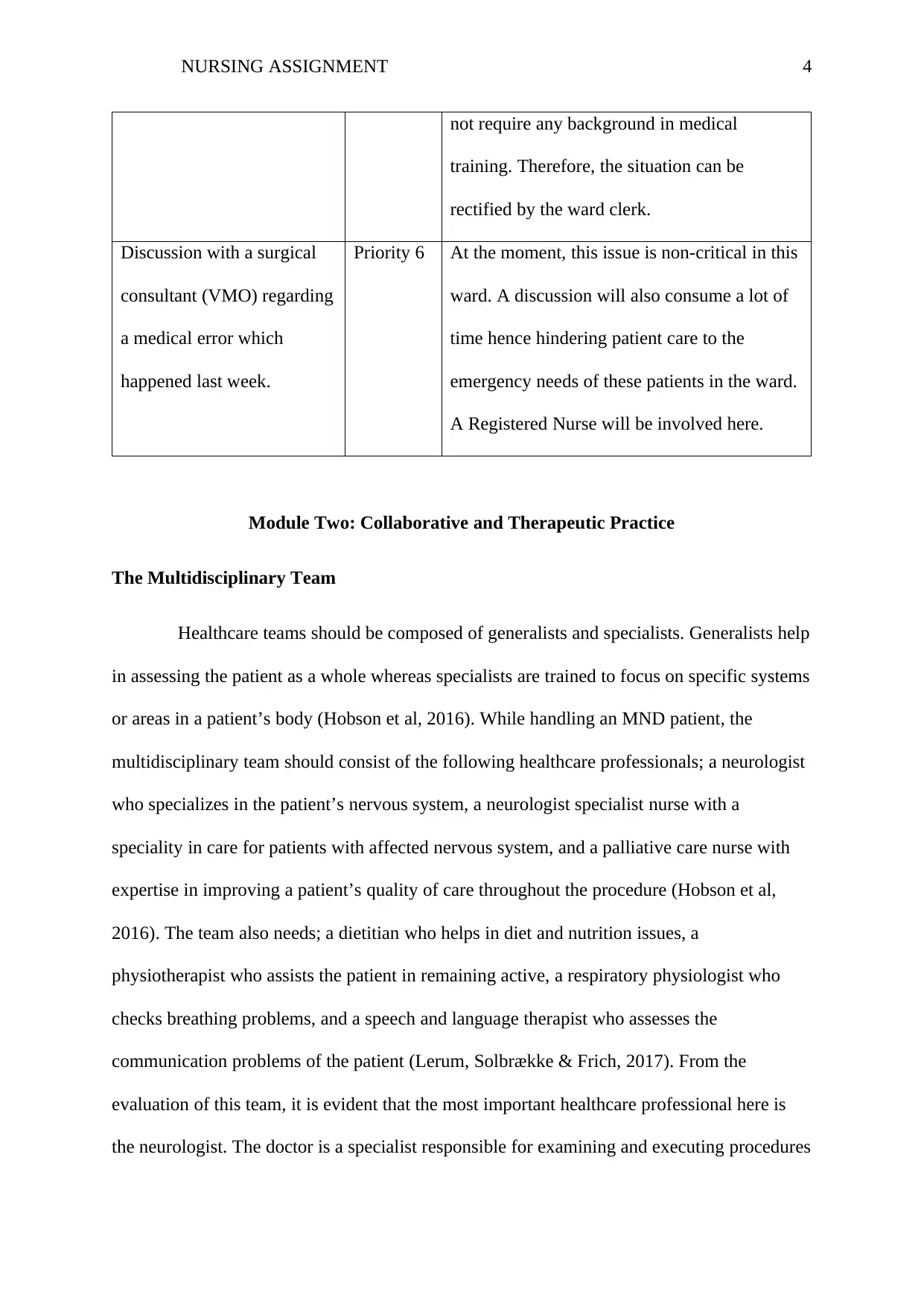
NURSING ASSIGNMENT 4
not require any background in medical
training. Therefore, the situation can be
rectified by the ward clerk.
Discussion with a surgical
consultant (VMO) regarding
a medical error which
happened last week.
Priority 6 At the moment, this issue is non-critical in this
ward. A discussion will also consume a lot of
time hence hindering patient care to the
emergency needs of these patients in the ward.
A Registered Nurse will be involved here.
Module Two: Collaborative and Therapeutic Practice
The Multidisciplinary Team
Healthcare teams should be composed of generalists and specialists. Generalists help
in assessing the patient as a whole whereas specialists are trained to focus on specific systems
or areas in a patient’s body (Hobson et al, 2016). While handling an MND patient, the
multidisciplinary team should consist of the following healthcare professionals; a neurologist
who specializes in the patient’s nervous system, a neurologist specialist nurse with a
speciality in care for patients with affected nervous system, and a palliative care nurse with
expertise in improving a patient’s quality of care throughout the procedure (Hobson et al,
2016). The team also needs; a dietitian who helps in diet and nutrition issues, a
physiotherapist who assists the patient in remaining active, a respiratory physiologist who
checks breathing problems, and a speech and language therapist who assesses the
communication problems of the patient (Lerum, Solbrække & Frich, 2017). From the
evaluation of this team, it is evident that the most important healthcare professional here is
the neurologist. The doctor is a specialist responsible for examining and executing procedures
not require any background in medical
training. Therefore, the situation can be
rectified by the ward clerk.
Discussion with a surgical
consultant (VMO) regarding
a medical error which
happened last week.
Priority 6 At the moment, this issue is non-critical in this
ward. A discussion will also consume a lot of
time hence hindering patient care to the
emergency needs of these patients in the ward.
A Registered Nurse will be involved here.
Module Two: Collaborative and Therapeutic Practice
The Multidisciplinary Team
Healthcare teams should be composed of generalists and specialists. Generalists help
in assessing the patient as a whole whereas specialists are trained to focus on specific systems
or areas in a patient’s body (Hobson et al, 2016). While handling an MND patient, the
multidisciplinary team should consist of the following healthcare professionals; a neurologist
who specializes in the patient’s nervous system, a neurologist specialist nurse with a
speciality in care for patients with affected nervous system, and a palliative care nurse with
expertise in improving a patient’s quality of care throughout the procedure (Hobson et al,
2016). The team also needs; a dietitian who helps in diet and nutrition issues, a
physiotherapist who assists the patient in remaining active, a respiratory physiologist who
checks breathing problems, and a speech and language therapist who assesses the
communication problems of the patient (Lerum, Solbrække & Frich, 2017). From the
evaluation of this team, it is evident that the most important healthcare professional here is
the neurologist. The doctor is a specialist responsible for examining and executing procedures
Paraphrase This Document
Need a fresh take? Get an instant paraphrase of this document with our AI Paraphraser
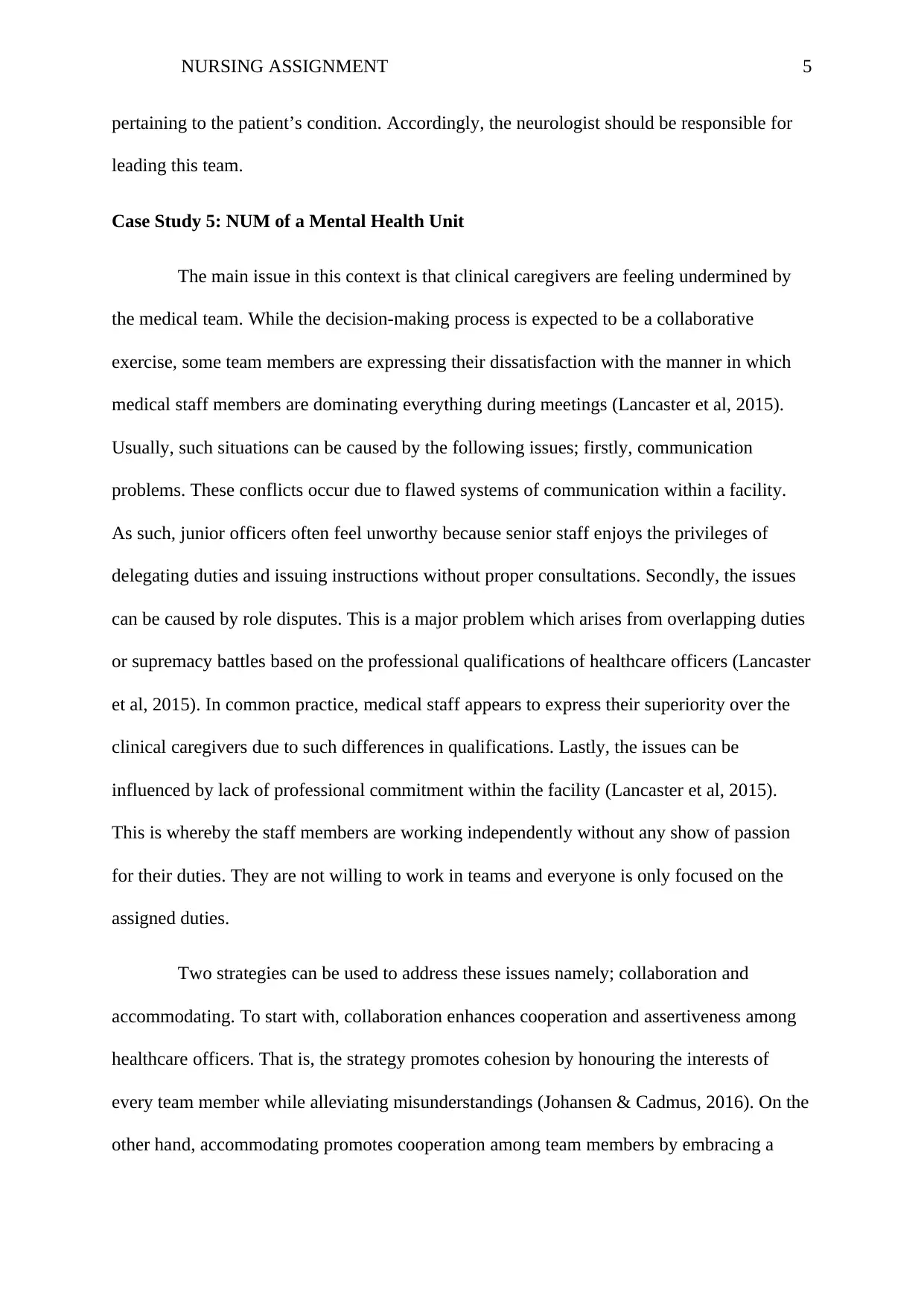
NURSING ASSIGNMENT 5
pertaining to the patient’s condition. Accordingly, the neurologist should be responsible for
leading this team.
Case Study 5: NUM of a Mental Health Unit
The main issue in this context is that clinical caregivers are feeling undermined by
the medical team. While the decision-making process is expected to be a collaborative
exercise, some team members are expressing their dissatisfaction with the manner in which
medical staff members are dominating everything during meetings (Lancaster et al, 2015).
Usually, such situations can be caused by the following issues; firstly, communication
problems. These conflicts occur due to flawed systems of communication within a facility.
As such, junior officers often feel unworthy because senior staff enjoys the privileges of
delegating duties and issuing instructions without proper consultations. Secondly, the issues
can be caused by role disputes. This is a major problem which arises from overlapping duties
or supremacy battles based on the professional qualifications of healthcare officers (Lancaster
et al, 2015). In common practice, medical staff appears to express their superiority over the
clinical caregivers due to such differences in qualifications. Lastly, the issues can be
influenced by lack of professional commitment within the facility (Lancaster et al, 2015).
This is whereby the staff members are working independently without any show of passion
for their duties. They are not willing to work in teams and everyone is only focused on the
assigned duties.
Two strategies can be used to address these issues namely; collaboration and
accommodating. To start with, collaboration enhances cooperation and assertiveness among
healthcare officers. That is, the strategy promotes cohesion by honouring the interests of
every team member while alleviating misunderstandings (Johansen & Cadmus, 2016). On the
other hand, accommodating promotes cooperation among team members by embracing a
pertaining to the patient’s condition. Accordingly, the neurologist should be responsible for
leading this team.
Case Study 5: NUM of a Mental Health Unit
The main issue in this context is that clinical caregivers are feeling undermined by
the medical team. While the decision-making process is expected to be a collaborative
exercise, some team members are expressing their dissatisfaction with the manner in which
medical staff members are dominating everything during meetings (Lancaster et al, 2015).
Usually, such situations can be caused by the following issues; firstly, communication
problems. These conflicts occur due to flawed systems of communication within a facility.
As such, junior officers often feel unworthy because senior staff enjoys the privileges of
delegating duties and issuing instructions without proper consultations. Secondly, the issues
can be caused by role disputes. This is a major problem which arises from overlapping duties
or supremacy battles based on the professional qualifications of healthcare officers (Lancaster
et al, 2015). In common practice, medical staff appears to express their superiority over the
clinical caregivers due to such differences in qualifications. Lastly, the issues can be
influenced by lack of professional commitment within the facility (Lancaster et al, 2015).
This is whereby the staff members are working independently without any show of passion
for their duties. They are not willing to work in teams and everyone is only focused on the
assigned duties.
Two strategies can be used to address these issues namely; collaboration and
accommodating. To start with, collaboration enhances cooperation and assertiveness among
healthcare officers. That is, the strategy promotes cohesion by honouring the interests of
every team member while alleviating misunderstandings (Johansen & Cadmus, 2016). On the
other hand, accommodating promotes cooperation among team members by embracing a
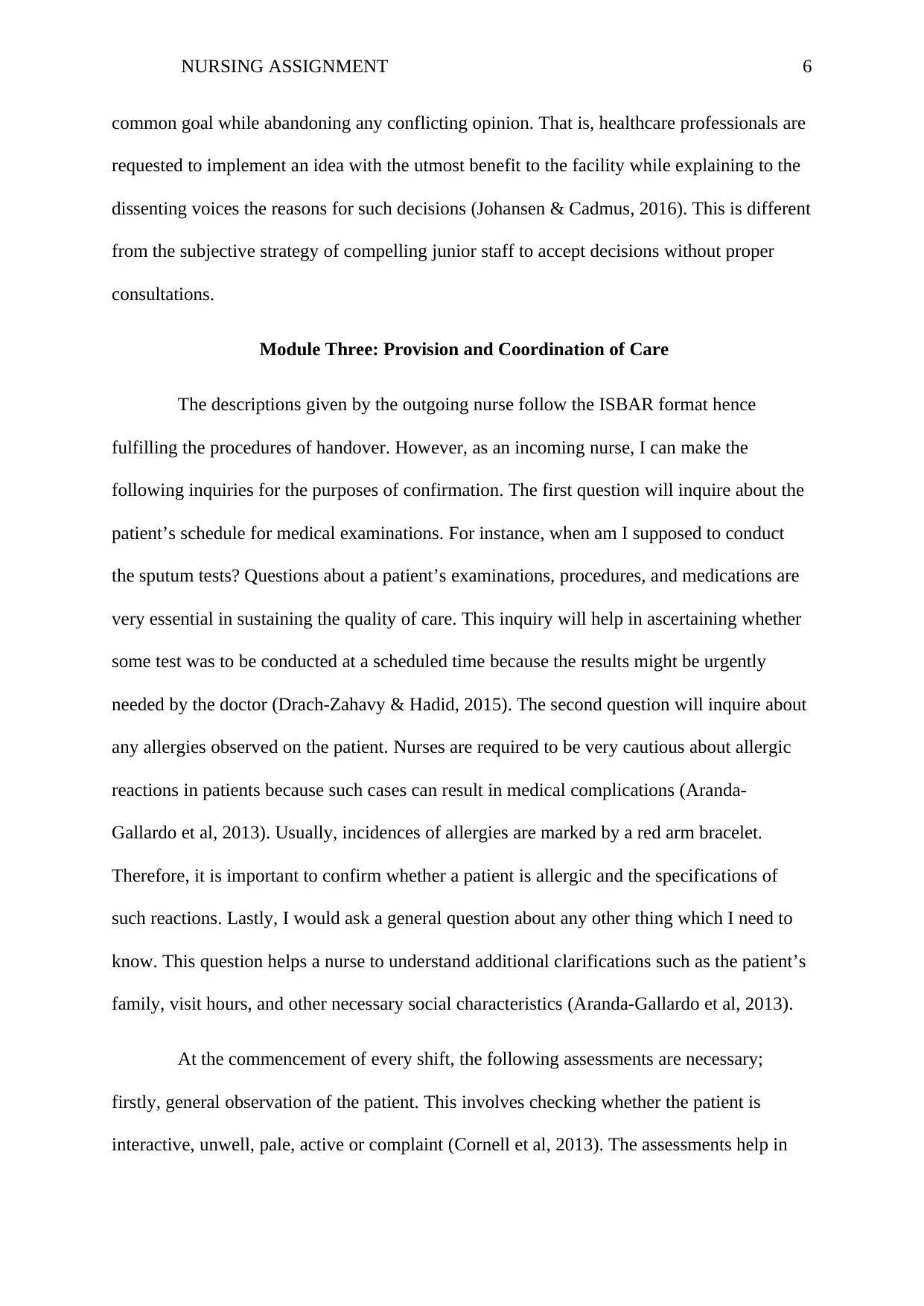
NURSING ASSIGNMENT 6
common goal while abandoning any conflicting opinion. That is, healthcare professionals are
requested to implement an idea with the utmost benefit to the facility while explaining to the
dissenting voices the reasons for such decisions (Johansen & Cadmus, 2016). This is different
from the subjective strategy of compelling junior staff to accept decisions without proper
consultations.
Module Three: Provision and Coordination of Care
The descriptions given by the outgoing nurse follow the ISBAR format hence
fulfilling the procedures of handover. However, as an incoming nurse, I can make the
following inquiries for the purposes of confirmation. The first question will inquire about the
patient’s schedule for medical examinations. For instance, when am I supposed to conduct
the sputum tests? Questions about a patient’s examinations, procedures, and medications are
very essential in sustaining the quality of care. This inquiry will help in ascertaining whether
some test was to be conducted at a scheduled time because the results might be urgently
needed by the doctor (Drach‐Zahavy & Hadid, 2015). The second question will inquire about
any allergies observed on the patient. Nurses are required to be very cautious about allergic
reactions in patients because such cases can result in medical complications (Aranda-
Gallardo et al, 2013). Usually, incidences of allergies are marked by a red arm bracelet.
Therefore, it is important to confirm whether a patient is allergic and the specifications of
such reactions. Lastly, I would ask a general question about any other thing which I need to
know. This question helps a nurse to understand additional clarifications such as the patient’s
family, visit hours, and other necessary social characteristics (Aranda-Gallardo et al, 2013).
At the commencement of every shift, the following assessments are necessary;
firstly, general observation of the patient. This involves checking whether the patient is
interactive, unwell, pale, active or complaint (Cornell et al, 2013). The assessments help in
common goal while abandoning any conflicting opinion. That is, healthcare professionals are
requested to implement an idea with the utmost benefit to the facility while explaining to the
dissenting voices the reasons for such decisions (Johansen & Cadmus, 2016). This is different
from the subjective strategy of compelling junior staff to accept decisions without proper
consultations.
Module Three: Provision and Coordination of Care
The descriptions given by the outgoing nurse follow the ISBAR format hence
fulfilling the procedures of handover. However, as an incoming nurse, I can make the
following inquiries for the purposes of confirmation. The first question will inquire about the
patient’s schedule for medical examinations. For instance, when am I supposed to conduct
the sputum tests? Questions about a patient’s examinations, procedures, and medications are
very essential in sustaining the quality of care. This inquiry will help in ascertaining whether
some test was to be conducted at a scheduled time because the results might be urgently
needed by the doctor (Drach‐Zahavy & Hadid, 2015). The second question will inquire about
any allergies observed on the patient. Nurses are required to be very cautious about allergic
reactions in patients because such cases can result in medical complications (Aranda-
Gallardo et al, 2013). Usually, incidences of allergies are marked by a red arm bracelet.
Therefore, it is important to confirm whether a patient is allergic and the specifications of
such reactions. Lastly, I would ask a general question about any other thing which I need to
know. This question helps a nurse to understand additional clarifications such as the patient’s
family, visit hours, and other necessary social characteristics (Aranda-Gallardo et al, 2013).
At the commencement of every shift, the following assessments are necessary;
firstly, general observation of the patient. This involves checking whether the patient is
interactive, unwell, pale, active or complaint (Cornell et al, 2013). The assessments help in
⊘ This is a preview!⊘
Do you want full access?
Subscribe today to unlock all pages.

Trusted by 1+ million students worldwide
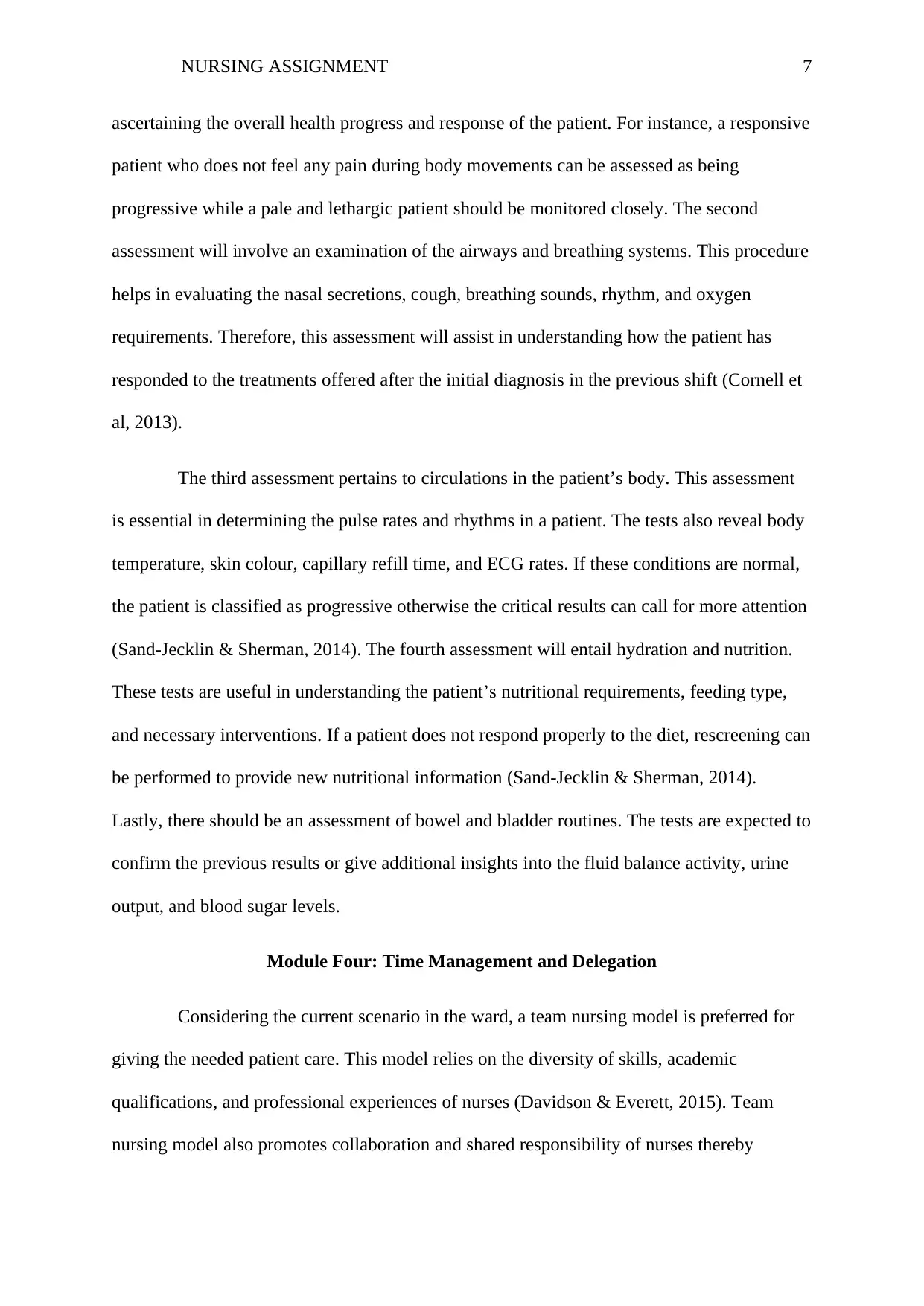
NURSING ASSIGNMENT 7
ascertaining the overall health progress and response of the patient. For instance, a responsive
patient who does not feel any pain during body movements can be assessed as being
progressive while a pale and lethargic patient should be monitored closely. The second
assessment will involve an examination of the airways and breathing systems. This procedure
helps in evaluating the nasal secretions, cough, breathing sounds, rhythm, and oxygen
requirements. Therefore, this assessment will assist in understanding how the patient has
responded to the treatments offered after the initial diagnosis in the previous shift (Cornell et
al, 2013).
The third assessment pertains to circulations in the patient’s body. This assessment
is essential in determining the pulse rates and rhythms in a patient. The tests also reveal body
temperature, skin colour, capillary refill time, and ECG rates. If these conditions are normal,
the patient is classified as progressive otherwise the critical results can call for more attention
(Sand‐Jecklin & Sherman, 2014). The fourth assessment will entail hydration and nutrition.
These tests are useful in understanding the patient’s nutritional requirements, feeding type,
and necessary interventions. If a patient does not respond properly to the diet, rescreening can
be performed to provide new nutritional information (Sand‐Jecklin & Sherman, 2014).
Lastly, there should be an assessment of bowel and bladder routines. The tests are expected to
confirm the previous results or give additional insights into the fluid balance activity, urine
output, and blood sugar levels.
Module Four: Time Management and Delegation
Considering the current scenario in the ward, a team nursing model is preferred for
giving the needed patient care. This model relies on the diversity of skills, academic
qualifications, and professional experiences of nurses (Davidson & Everett, 2015). Team
nursing model also promotes collaboration and shared responsibility of nurses thereby
ascertaining the overall health progress and response of the patient. For instance, a responsive
patient who does not feel any pain during body movements can be assessed as being
progressive while a pale and lethargic patient should be monitored closely. The second
assessment will involve an examination of the airways and breathing systems. This procedure
helps in evaluating the nasal secretions, cough, breathing sounds, rhythm, and oxygen
requirements. Therefore, this assessment will assist in understanding how the patient has
responded to the treatments offered after the initial diagnosis in the previous shift (Cornell et
al, 2013).
The third assessment pertains to circulations in the patient’s body. This assessment
is essential in determining the pulse rates and rhythms in a patient. The tests also reveal body
temperature, skin colour, capillary refill time, and ECG rates. If these conditions are normal,
the patient is classified as progressive otherwise the critical results can call for more attention
(Sand‐Jecklin & Sherman, 2014). The fourth assessment will entail hydration and nutrition.
These tests are useful in understanding the patient’s nutritional requirements, feeding type,
and necessary interventions. If a patient does not respond properly to the diet, rescreening can
be performed to provide new nutritional information (Sand‐Jecklin & Sherman, 2014).
Lastly, there should be an assessment of bowel and bladder routines. The tests are expected to
confirm the previous results or give additional insights into the fluid balance activity, urine
output, and blood sugar levels.
Module Four: Time Management and Delegation
Considering the current scenario in the ward, a team nursing model is preferred for
giving the needed patient care. This model relies on the diversity of skills, academic
qualifications, and professional experiences of nurses (Davidson & Everett, 2015). Team
nursing model also promotes collaboration and shared responsibility of nurses thereby
Paraphrase This Document
Need a fresh take? Get an instant paraphrase of this document with our AI Paraphraser
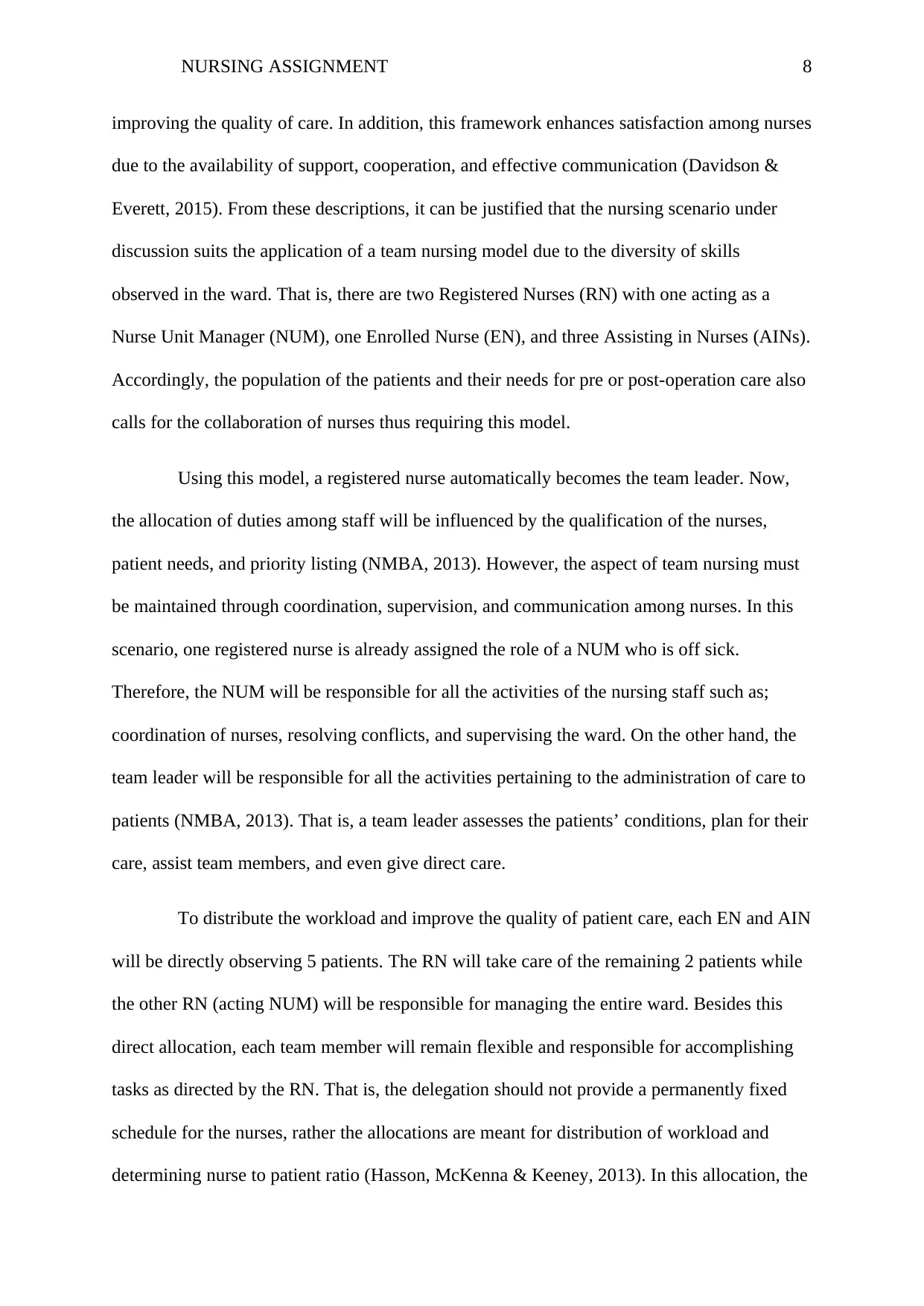
NURSING ASSIGNMENT 8
improving the quality of care. In addition, this framework enhances satisfaction among nurses
due to the availability of support, cooperation, and effective communication (Davidson &
Everett, 2015). From these descriptions, it can be justified that the nursing scenario under
discussion suits the application of a team nursing model due to the diversity of skills
observed in the ward. That is, there are two Registered Nurses (RN) with one acting as a
Nurse Unit Manager (NUM), one Enrolled Nurse (EN), and three Assisting in Nurses (AINs).
Accordingly, the population of the patients and their needs for pre or post-operation care also
calls for the collaboration of nurses thus requiring this model.
Using this model, a registered nurse automatically becomes the team leader. Now,
the allocation of duties among staff will be influenced by the qualification of the nurses,
patient needs, and priority listing (NMBA, 2013). However, the aspect of team nursing must
be maintained through coordination, supervision, and communication among nurses. In this
scenario, one registered nurse is already assigned the role of a NUM who is off sick.
Therefore, the NUM will be responsible for all the activities of the nursing staff such as;
coordination of nurses, resolving conflicts, and supervising the ward. On the other hand, the
team leader will be responsible for all the activities pertaining to the administration of care to
patients (NMBA, 2013). That is, a team leader assesses the patients’ conditions, plan for their
care, assist team members, and even give direct care.
To distribute the workload and improve the quality of patient care, each EN and AIN
will be directly observing 5 patients. The RN will take care of the remaining 2 patients while
the other RN (acting NUM) will be responsible for managing the entire ward. Besides this
direct allocation, each team member will remain flexible and responsible for accomplishing
tasks as directed by the RN. That is, the delegation should not provide a permanently fixed
schedule for the nurses, rather the allocations are meant for distribution of workload and
determining nurse to patient ratio (Hasson, McKenna & Keeney, 2013). In this allocation, the
improving the quality of care. In addition, this framework enhances satisfaction among nurses
due to the availability of support, cooperation, and effective communication (Davidson &
Everett, 2015). From these descriptions, it can be justified that the nursing scenario under
discussion suits the application of a team nursing model due to the diversity of skills
observed in the ward. That is, there are two Registered Nurses (RN) with one acting as a
Nurse Unit Manager (NUM), one Enrolled Nurse (EN), and three Assisting in Nurses (AINs).
Accordingly, the population of the patients and their needs for pre or post-operation care also
calls for the collaboration of nurses thus requiring this model.
Using this model, a registered nurse automatically becomes the team leader. Now,
the allocation of duties among staff will be influenced by the qualification of the nurses,
patient needs, and priority listing (NMBA, 2013). However, the aspect of team nursing must
be maintained through coordination, supervision, and communication among nurses. In this
scenario, one registered nurse is already assigned the role of a NUM who is off sick.
Therefore, the NUM will be responsible for all the activities of the nursing staff such as;
coordination of nurses, resolving conflicts, and supervising the ward. On the other hand, the
team leader will be responsible for all the activities pertaining to the administration of care to
patients (NMBA, 2013). That is, a team leader assesses the patients’ conditions, plan for their
care, assist team members, and even give direct care.
To distribute the workload and improve the quality of patient care, each EN and AIN
will be directly observing 5 patients. The RN will take care of the remaining 2 patients while
the other RN (acting NUM) will be responsible for managing the entire ward. Besides this
direct allocation, each team member will remain flexible and responsible for accomplishing
tasks as directed by the RN. That is, the delegation should not provide a permanently fixed
schedule for the nurses, rather the allocations are meant for distribution of workload and
determining nurse to patient ratio (Hasson, McKenna & Keeney, 2013). In this allocation, the
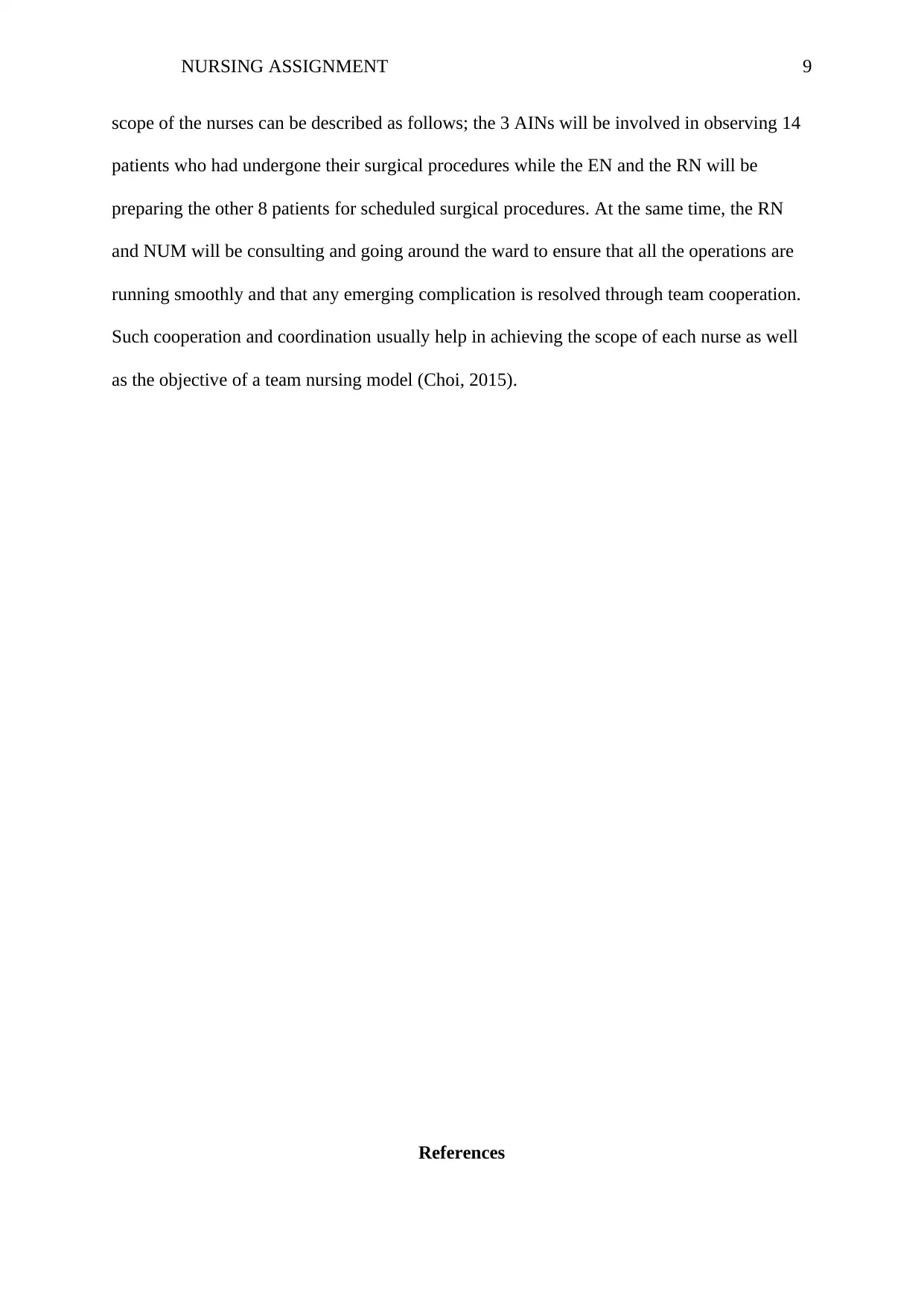
NURSING ASSIGNMENT 9
scope of the nurses can be described as follows; the 3 AINs will be involved in observing 14
patients who had undergone their surgical procedures while the EN and the RN will be
preparing the other 8 patients for scheduled surgical procedures. At the same time, the RN
and NUM will be consulting and going around the ward to ensure that all the operations are
running smoothly and that any emerging complication is resolved through team cooperation.
Such cooperation and coordination usually help in achieving the scope of each nurse as well
as the objective of a team nursing model (Choi, 2015).
References
scope of the nurses can be described as follows; the 3 AINs will be involved in observing 14
patients who had undergone their surgical procedures while the EN and the RN will be
preparing the other 8 patients for scheduled surgical procedures. At the same time, the RN
and NUM will be consulting and going around the ward to ensure that all the operations are
running smoothly and that any emerging complication is resolved through team cooperation.
Such cooperation and coordination usually help in achieving the scope of each nurse as well
as the objective of a team nursing model (Choi, 2015).
References
⊘ This is a preview!⊘
Do you want full access?
Subscribe today to unlock all pages.

Trusted by 1+ million students worldwide
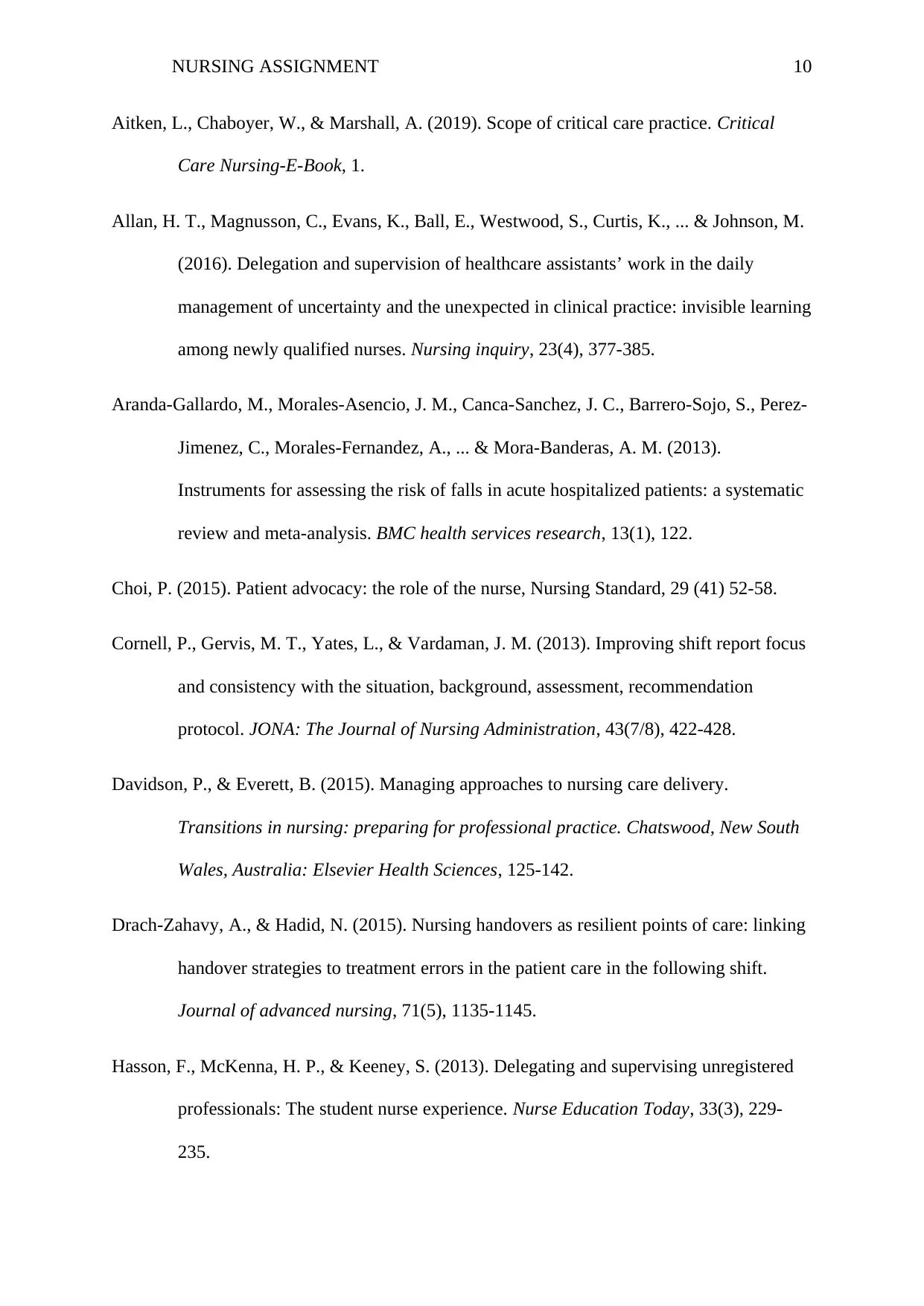
NURSING ASSIGNMENT 10
Aitken, L., Chaboyer, W., & Marshall, A. (2019). Scope of critical care practice. Critical
Care Nursing-E-Book, 1.
Allan, H. T., Magnusson, C., Evans, K., Ball, E., Westwood, S., Curtis, K., ... & Johnson, M.
(2016). Delegation and supervision of healthcare assistants’ work in the daily
management of uncertainty and the unexpected in clinical practice: invisible learning
among newly qualified nurses. Nursing inquiry, 23(4), 377-385.
Aranda-Gallardo, M., Morales-Asencio, J. M., Canca-Sanchez, J. C., Barrero-Sojo, S., Perez-
Jimenez, C., Morales-Fernandez, A., ... & Mora-Banderas, A. M. (2013).
Instruments for assessing the risk of falls in acute hospitalized patients: a systematic
review and meta-analysis. BMC health services research, 13(1), 122.
Choi, P. (2015). Patient advocacy: the role of the nurse, Nursing Standard, 29 (41) 52-58.
Cornell, P., Gervis, M. T., Yates, L., & Vardaman, J. M. (2013). Improving shift report focus
and consistency with the situation, background, assessment, recommendation
protocol. JONA: The Journal of Nursing Administration, 43(7/8), 422-428.
Davidson, P., & Everett, B. (2015). Managing approaches to nursing care delivery.
Transitions in nursing: preparing for professional practice. Chatswood, New South
Wales, Australia: Elsevier Health Sciences, 125-142.
Drach‐Zahavy, A., & Hadid, N. (2015). Nursing handovers as resilient points of care: linking
handover strategies to treatment errors in the patient care in the following shift.
Journal of advanced nursing, 71(5), 1135-1145.
Hasson, F., McKenna, H. P., & Keeney, S. (2013). Delegating and supervising unregistered
professionals: The student nurse experience. Nurse Education Today, 33(3), 229-
235.
Aitken, L., Chaboyer, W., & Marshall, A. (2019). Scope of critical care practice. Critical
Care Nursing-E-Book, 1.
Allan, H. T., Magnusson, C., Evans, K., Ball, E., Westwood, S., Curtis, K., ... & Johnson, M.
(2016). Delegation and supervision of healthcare assistants’ work in the daily
management of uncertainty and the unexpected in clinical practice: invisible learning
among newly qualified nurses. Nursing inquiry, 23(4), 377-385.
Aranda-Gallardo, M., Morales-Asencio, J. M., Canca-Sanchez, J. C., Barrero-Sojo, S., Perez-
Jimenez, C., Morales-Fernandez, A., ... & Mora-Banderas, A. M. (2013).
Instruments for assessing the risk of falls in acute hospitalized patients: a systematic
review and meta-analysis. BMC health services research, 13(1), 122.
Choi, P. (2015). Patient advocacy: the role of the nurse, Nursing Standard, 29 (41) 52-58.
Cornell, P., Gervis, M. T., Yates, L., & Vardaman, J. M. (2013). Improving shift report focus
and consistency with the situation, background, assessment, recommendation
protocol. JONA: The Journal of Nursing Administration, 43(7/8), 422-428.
Davidson, P., & Everett, B. (2015). Managing approaches to nursing care delivery.
Transitions in nursing: preparing for professional practice. Chatswood, New South
Wales, Australia: Elsevier Health Sciences, 125-142.
Drach‐Zahavy, A., & Hadid, N. (2015). Nursing handovers as resilient points of care: linking
handover strategies to treatment errors in the patient care in the following shift.
Journal of advanced nursing, 71(5), 1135-1145.
Hasson, F., McKenna, H. P., & Keeney, S. (2013). Delegating and supervising unregistered
professionals: The student nurse experience. Nurse Education Today, 33(3), 229-
235.
Paraphrase This Document
Need a fresh take? Get an instant paraphrase of this document with our AI Paraphraser
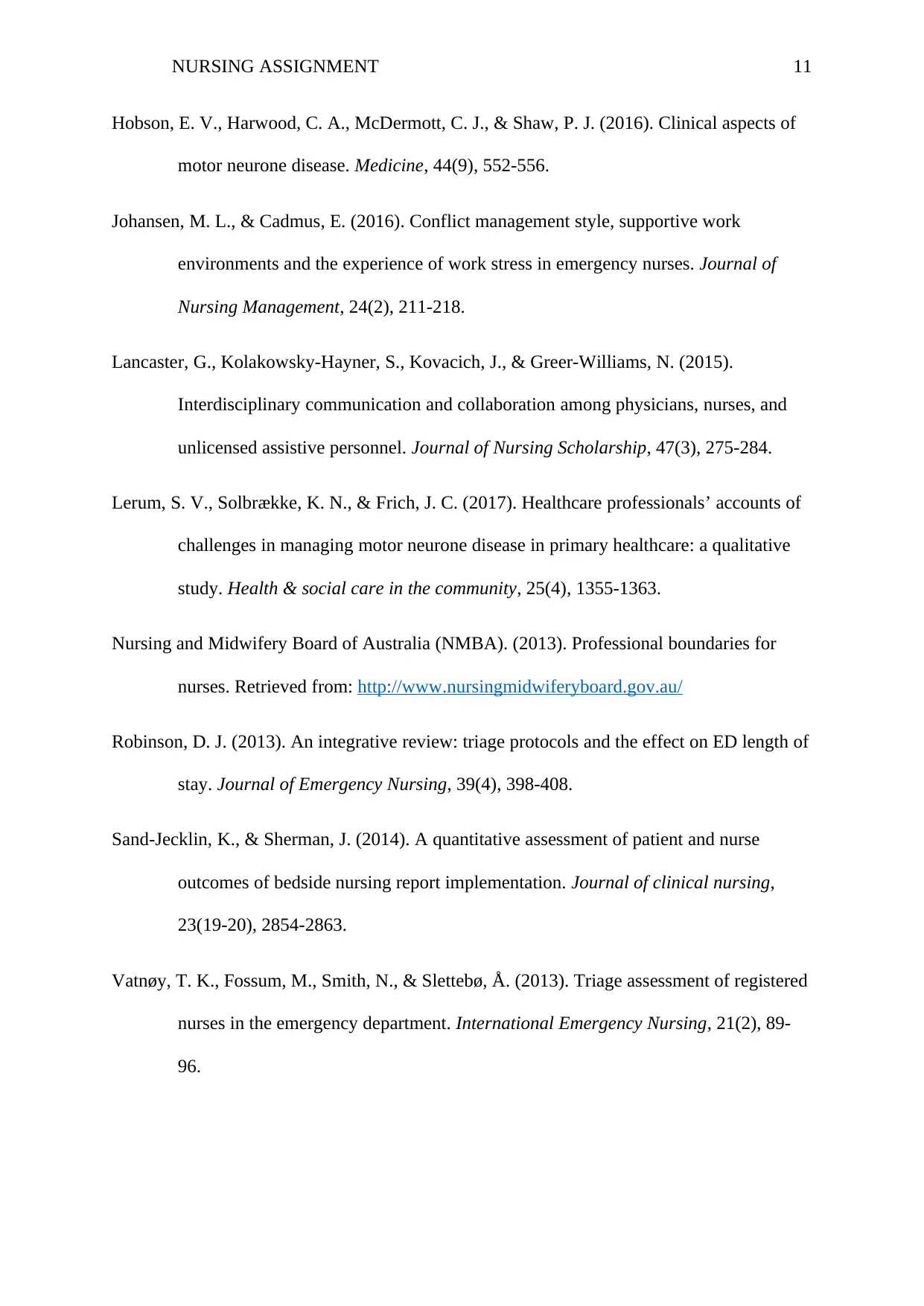
NURSING ASSIGNMENT 11
Hobson, E. V., Harwood, C. A., McDermott, C. J., & Shaw, P. J. (2016). Clinical aspects of
motor neurone disease. Medicine, 44(9), 552-556.
Johansen, M. L., & Cadmus, E. (2016). Conflict management style, supportive work
environments and the experience of work stress in emergency nurses. Journal of
Nursing Management, 24(2), 211-218.
Lancaster, G., Kolakowsky‐Hayner, S., Kovacich, J., & Greer‐Williams, N. (2015).
Interdisciplinary communication and collaboration among physicians, nurses, and
unlicensed assistive personnel. Journal of Nursing Scholarship, 47(3), 275-284.
Lerum, S. V., Solbrække, K. N., & Frich, J. C. (2017). Healthcare professionals’ accounts of
challenges in managing motor neurone disease in primary healthcare: a qualitative
study. Health & social care in the community, 25(4), 1355-1363.
Nursing and Midwifery Board of Australia (NMBA). (2013). Professional boundaries for
nurses. Retrieved from: http://www.nursingmidwiferyboard.gov.au/
Robinson, D. J. (2013). An integrative review: triage protocols and the effect on ED length of
stay. Journal of Emergency Nursing, 39(4), 398-408.
Sand‐Jecklin, K., & Sherman, J. (2014). A quantitative assessment of patient and nurse
outcomes of bedside nursing report implementation. Journal of clinical nursing,
23(19-20), 2854-2863.
Vatnøy, T. K., Fossum, M., Smith, N., & Slettebø, Å. (2013). Triage assessment of registered
nurses in the emergency department. International Emergency Nursing, 21(2), 89-
96.
Hobson, E. V., Harwood, C. A., McDermott, C. J., & Shaw, P. J. (2016). Clinical aspects of
motor neurone disease. Medicine, 44(9), 552-556.
Johansen, M. L., & Cadmus, E. (2016). Conflict management style, supportive work
environments and the experience of work stress in emergency nurses. Journal of
Nursing Management, 24(2), 211-218.
Lancaster, G., Kolakowsky‐Hayner, S., Kovacich, J., & Greer‐Williams, N. (2015).
Interdisciplinary communication and collaboration among physicians, nurses, and
unlicensed assistive personnel. Journal of Nursing Scholarship, 47(3), 275-284.
Lerum, S. V., Solbrække, K. N., & Frich, J. C. (2017). Healthcare professionals’ accounts of
challenges in managing motor neurone disease in primary healthcare: a qualitative
study. Health & social care in the community, 25(4), 1355-1363.
Nursing and Midwifery Board of Australia (NMBA). (2013). Professional boundaries for
nurses. Retrieved from: http://www.nursingmidwiferyboard.gov.au/
Robinson, D. J. (2013). An integrative review: triage protocols and the effect on ED length of
stay. Journal of Emergency Nursing, 39(4), 398-408.
Sand‐Jecklin, K., & Sherman, J. (2014). A quantitative assessment of patient and nurse
outcomes of bedside nursing report implementation. Journal of clinical nursing,
23(19-20), 2854-2863.
Vatnøy, T. K., Fossum, M., Smith, N., & Slettebø, Å. (2013). Triage assessment of registered
nurses in the emergency department. International Emergency Nursing, 21(2), 89-
96.
1 out of 11
Related Documents
Your All-in-One AI-Powered Toolkit for Academic Success.
+13062052269
info@desklib.com
Available 24*7 on WhatsApp / Email
![[object Object]](/_next/static/media/star-bottom.7253800d.svg)
Unlock your academic potential
Copyright © 2020–2026 A2Z Services. All Rights Reserved. Developed and managed by ZUCOL.





